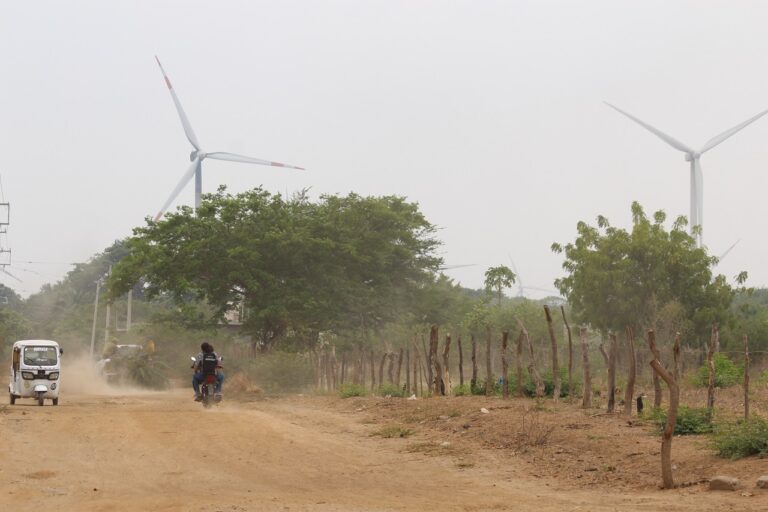- After more than three years of legal wrangling, a court in Paris has ruled that a civil case brought by Indigenous communities in Mexico against French energy giant EDF can go ahead.
- The case was filed by Zapotec communities in Oaxaca state, who complain that EDF’s Gunaa Sicarú wind farm project violates their land rights and lacks reasonable consultation with communities.
- The case against EDF was filed under the recently approved French Corporate Duty of Vigilance Law, designed to hold French companies accountable for abuses overseas.
- Projects that support the energy transition and climate change mitigation can stir local conflicts similar to those associated with fossil fuels if community rights are not properly considered, experts warn.
JUCHITÁN, Mexico – Indigenous farmers from southern Mexico angry over landscape damage and poor consultations associated with a massive wind power project have had their day in court in France, where judges have allowed their case to proceed.
Zapotec communities from the Isthmus of Tehuantepec in the state of Oaxaca and their supporters in Europe launched a legal action against French energy giant EDF, alleging the company failed to prevent violence and intimidation of residents who opposed the wind farms on their ancestral land.
After more than three years of legal wrangling, judges at the Paris Court of Appeals authorized the civil case to go forward in a ruling issued June 18, according to a statement from the plaintiffs’ lawyers.
“This landmark decision sends a clear message for transnational corporations,” said Guillermo Torres, a senior lawyer with the Mexican campaign group ProDESC, which helped launch the court action. “Their activities can be subject to judicial review whenever they fail to comply with the law.”

The court didn’t order EDF to suspend its project, known as the Gunaa Sicarú wind farm, until the merits of the case could be examined at a later date, lawyers said. The June 18 court decision reversed a 2021 move by EDF’s lawyers that stalled the litigation on procedural grounds. The case against EDF was first launched in October 2020.
The ongoing litigation in Paris revolves around past harms associated with Gunaa Sicarú, said Torres. The date for the next court hearing has not been set.
The case highlights how some Indigenous rights campaigners are turning to courts in the home countries of major investors to seek redress for alleged land and environmental rights violations. It also showcases how megaprojects associated with mitigating climate change can produce local conflicts similar to those triggered by fossil fuels if adequate safeguards aren’t put in place.
“If this energy transition is only being focused on the economic lens, and not on the impact of climate change on human rights, then these projects are destined to keep perpetuating those abuses,” Torres told Mongabay.
“The communities do not oppose the energy transition … But that doesn’t mean these projects have carte blanche.”
A test for France’s Duty of Vigilance Law
Local supporters of the wind investments say they’re crucial for addressing climate change by reducing greenhouse gas emissions and transitioning Mexico’s oil-dependent economy away from fossil fuels. Currently, much of Mexico’s growing electricity demand is fed by imported natural gas.
They also point to local job creation, income for landowners who rent property to companies for their turbines, and more tax revenue for the traditionally poor region’s schools, roads and public infrastructure.
The case against EDF over its wind projects in Mexico was filed under the French Corporate Duty of Vigilance Law, recent legislation designed to hold French companies accountable for abuses overseas.
Mexico’s Union Hidalgo region, a hotspot for wind projects in Oaxaca state, is the first Indigenous community to invoke its collective land rights under this French supply chain law, according to the European Center for Constitutional and Human Rights.
Conundrums over consultations
Longtime Union Hidalgo resident Pedro Matus has been raising cattle for decades. Now his single-story home is surrounded by windmills, which he blames for landscape destruction, killing migratory birds and dividing the community, leading to threats and harassment targeting him and other wind farm opponents.

The Indigenous Zapotec farmer said EDF had wanted to build its project on a tract of communal land comprising more than 4,000 hectares (about 10,000 acres) where he and other residents raised their animals and crops.
“These projects are bringing social problems,” Matus said during an interview at his home. “They [wind companies] believe we are the enemies.”
When EDF first proposed building the project, it organized assemblies to discuss the development with residents, a common practice in Mexico, and something the company touts in its vigilance plan for obtaining consent from residents and mitigating risks like violence.
Problems with the consultations started around 2009, when EDF installed its first turbine, Matus said.
The meetings were typically attended by hundreds of people. At the meetings, Matus said, he and other opponents were harassed and threatened by landowners who had been paid by EDF to install windmills on their land.
It’s a trend Lourdes Alonso, a professor at the University of the Sea in Oaxaca who studies conflicts over wind power on the Isthmus of Tehuantepec, has encountered frequently in the state.

“There has been a lot of harassment of campaigners and social movements,” she said. “The division of communities is something that people mention a lot. One sector of the population accepted the investment because they could rent [out their] land and other sectors opposed because it would mean environmental and cultural impacts.”
Today, the isthmus hosts an estimated 1,000 windmills from several companies, mostly from Europe, Alonso said, making it one of the biggest wind energy development areas in Latin America, representing hundreds of millions of dollars in investments.
Former EDF official blames campaign groups for strife
Juan Tamayo had been a top EDF official in Oaxaca for more than two decades, before his retirement earlier this year. While he no longer officially speaks for the company, he rejected the critiques from Alonso and Matus.
Most communities surrounding the project supported EDF’s investments, he said, with more than 1,000 people attending some of its assemblies to discuss the wind farms, and many receiving money for leasing out their land.
Once the company started making payments and getting ready to build, he said, an outside civil society group “came in and started their own assemblies with 40-50 people.”
“They claimed they were representing the whole community, but it’s not a legitimate number,” Tamayo said.
That agitation, he said, led Mexico’s Federal Electricity Commission (CFE), the national grid operator, to cancel its power supply contract with EDF for buying electricity from Gunaa Sicarú in 2022, meaning a multimillion-dollar project had nowhere to sell its power.
Other analysts, however, say the CFE’s move was based on a federal court decision in Oaxaca from 2021, when judicial authorities suspended EDF’s project, citing Indigenous rights violations and problems with the company’s consultations.
An armed guard at EDF’s local offices in Juchitán district referred Mongabay’s interview requests to its office in Mexico City. A spokesperson for the company’s international office said: “At this time EDF Renewables does not have any comment on the situation.”
‘Energy doesn’t have a social vision’
In the offices of the Ecological Forum, an environmental organization with deep roots in Juchitán, the group’s legal representative, Gonzalo Bustillo, said he’s noticed migratory birds that used to come to the isthmus have changed their routes since the installation of the windmills.
“This energy doesn’t have a social vision; it’s a vision for the big companies,” Bustillo said, sitting surrounded by folk art and smoking a filterless cigarette as other staff members shuffled papers and answered phones.
Big swaths of farmland have been disrupted by concrete platforms installed by the companies, he added, leaving behind areas where “nothing is growing.”

On the streets of Union Hidalgo, few people had heard about the French litigation but most had strong opinions on the wind projects.
“I know they’re bringing benefits, but they’re also dividing communities,” said waitress Nisado Lopez Valdivieso.
Some families have seen small reductions in their energy bills due to the projects, and others are profiting by renting out their property, she said. But she added she worries farmers and ranchers have been leaving the land due to the investments, hurting local food production in the process.
“I believe it’s good to have foreign investment,” Lopez Valdivieso said. “But it’s a bit sour and confusing because on one side they are helping but on the other side they are hurting.”
It will likely be months, if not years, for the EDF case in France to reach a final verdict. Campaigners say litigation around land rights and community divisions is likely to intensify beyond Mexico as the drive for a clean energy transition heats up along with the global climate.
“We have to understand energy as a social matter to try and create a more just energy transition,” said Alonso, the university professor. “I think that technically it’s possible to create such a transition, but if it creates sacrifice zones, that is not the transition we want.”
The travel and reporting for this story were funded by a grant from the Global Reporting Centre and Social Sciences Humanities and Research Council. Mongabay maintains complete editorial independence over the reporting.
Banner image: Cars and motorcycles drive alongside wind turbines in Union Hidalgo, Mexico on Saturday, June 8. The region is home to one of Latin America’s largest wind projects with hundreds of millions of dollars invested by primarily European energy firms. Image by Chris Arsenault for Mongabay.
FEEDBACK: Use this form to send a message to the author of this post. If you want to post a public comment, you can do that at the bottom of the page.



